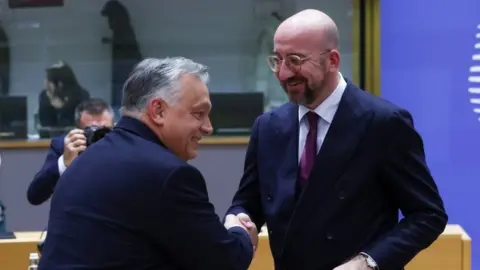Israel Gaza: EU calls for 'corridors and pauses' for humanitarian aid
 Reuters
ReutersEU leaders have called for "corridors and pauses" as a means to get badly needed humanitarian aid into Gaza.
After more than five hours of talks at a summit in Brussels, a joint statement urged safe and unhindered access.
It follows days of disagreement, with some member states arguing for a longer, single pause in the fighting.
Israel began bombing Gaza and cut off fuel, food and other supplies after Hamas's attack in which 1,400 people were killed and 224 taken hostage.
Gaza's Hamas-run health ministry says more than 7,000 people have been killed in the territory since then and that its health system is facing total collapse, with a third of hospitals not functioning and the rest only treating emergency cases.
Only small amounts of aid have started reaching Gaza in recent days.
The EU leaders' summit is their first face-to-face meeting since the 7 October attacks.
Their statement condemns the Hamas attacks and "strongly emphasises Israel's right to defend itself in line with international law".
"The European Council expresses its gravest concern for the deteriorating humanitarian situation in Gaza and calls for continued, rapid, safe and unhindered humanitarian access and aid to reach those in need through all necessary measures including humanitarian corridors and pauses for humanitarian needs," the statement reads.
This may not seem like much, but for an institution that represents 27 countries with some fundamentally opposing views on the Israel-Palestinian conflict - it's a compromise.
"Humanitarian pauses" are meant as short intervals of just a few hours, so that the EU can "work closely with partners in the region to protect civilians, provide assistance and facilitate access to food, water, medical care, fuel and shelter, ensuring that such assistance is not abused by terrorist organisations", the statement reads.
This follows days of complex negotiations about whether to call for a "pause" (singular) or "pauses" (plural).
"A single, humanitarian pause would be too close to the concept of a ceasefire - when Israel has the right to defend itself from attack," an EU diplomat told the BBC.
"A pause means both actors stop for good, whereas pauses is temporary."
This position was shared by those European countries that have taken a strong pro-Israel stance - including Hungary, Austria, the Czech Republic and most importantly Germany, which undoubtedly had a big say in the wording of the EU statement.
Some countries will be disappointed. Both Ireland's and Spain's leaders, speaking to journalists before the start of the negotiations, had called for a ceasefire.
But the Spanish caretaker Prime Minister Pedro Sánchez will be pleased about a new line added to the EU statement at the last minute: "The European Union supports the holding of an international peace conference soon."
He had called earlier today for an international peace summit in six months to find a solution to the long-standing conflict in the region.
The EU is not a military power - all they can do, really, is exercise diplomatic pressure and grant aid.
And ultimately, this statement might not change anything. Earlier today Benny Gantz, a member of Israel's war cabinet, said the country would make its own decisions about its war plans in Gaza, based on its own interests.

More on Israel-Gaza war
- Follow live: Latest updates
- Explained: What is happening in Israel and Gaza, and why now?
- History behind the story: The Israel-Palestinian conflict
- Hostages: Who are the hostages taken by Hamas from Israel?
- Bowen: Israelis and Palestinians fear worst is yet to come

